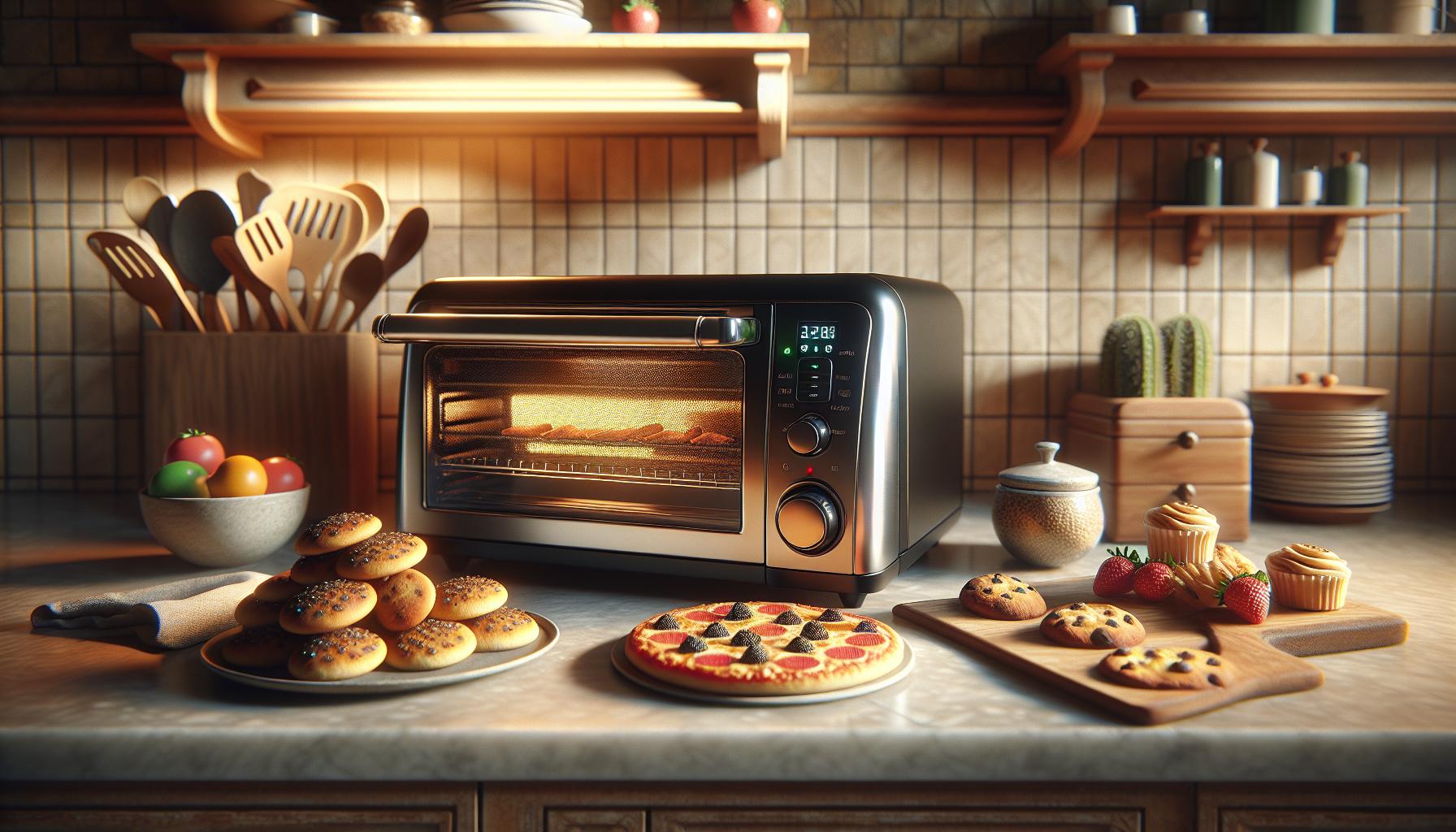Tiny kitchen? Limited counter space? No problem! The humble toaster oven isn’t just for reheating leftover pizza or making toast anymore. This versatile kitchen companion can actually whip up delicious baked goods from cookies to casseroles with surprisingly professional results.
While traditional ovens might steal the spotlight in most baking conversations the compact toaster oven offers unique advantages. It preheats faster uses less energy and won’t turn your kitchen into a sauna during summer baking sessions. Plus there’s something oddly satisfying about creating mouthwatering treats in an appliance that fits on your countertop. Whether you’re a college student in a dorm room or a minimalist baker looking to simplify your life the toaster oven might just become your new favorite baking buddy.
What Is a Toaster Oven and How It Works
A toaster oven combines the functions of a toaster and a conventional oven in a compact countertop appliance. Electric heating elements, positioned at the top and bottom of the cooking chamber, generate radiant heat for cooking food.
Modern toaster ovens feature multiple cooking modes:
- Bake mode distributes heat evenly throughout the chamber
- Broil setting activates only the top heating elements
- Toast function engages both elements at high temperatures
- Convection fans circulate hot air for faster cooking
The internal components work together to maintain precise temperatures:
- Thermostats regulate cooking temperature
- Timers control cooking duration
- Heating element switches manage power distribution
- Rack positions allow for versatile food placement
Standard toaster oven specifications include:
| Feature | Typical Range |
|---|---|
| Temperature | 150°F – 450°F |
| Capacity | 0.3 – 0.9 cubic feet |
| Power Usage | 1200 – 1800 watts |
| Cooking Space | 9″ x 13″ pan size |
The cooking process follows three main phases:
- Preheating activates heating elements to reach desired temperature
- Temperature maintenance keeps steady heat throughout cooking
- Automatic shutoff prevents overcooking when timer ends
- LCD display readings of time temperature
- Preset cooking functions for common foods
- Adjustable rack positions for different recipes
- Interior light monitoring of food progress
Benefits of Baking With a Toaster Oven

Toaster ovens enhance the baking experience with practical advantages over conventional ovens. These compact appliances deliver efficient performance while maximizing kitchen utility.
Energy Efficiency and Quick Preheating
Toaster ovens consume 50% less energy than traditional ovens during standard baking tasks. The smaller heating chamber reaches optimal temperatures in 3-5 minutes compared to 10-15 minutes for conventional ovens. Energy costs decrease by approximately $15-25 per month with regular toaster oven use instead of a full-size oven. The focused heating elements direct heat precisely where needed, eliminating wasted energy from heating unused space.
| Energy Comparison | Toaster Oven | Conventional Oven |
|---|---|---|
| Preheat Time | 3-5 minutes | 10-15 minutes |
| Monthly Energy Cost | $5-10 | $20-35 |
| Power Usage | 1200-1400W | 2000-5000W |
Perfect for Small Batches
Toaster ovens excel at baking small portions with consistent results. The compact space accommodates 4-6 cookies, 2 personal pizzas or a 9-inch cake pan. Internal temperature distribution remains steady throughout the cooking process due to the concentrated heating area. Toaster ovens eliminate excess food waste by allowing precise portion control for single servings or small households. The reduced cavity size creates ideal conditions for proofing bread dough, melting cheese toppings or achieving golden-brown crusts on individual desserts.
| Small Batch Capacity | Quantity |
|---|---|
| Cookies | 4-6 |
| Personal Pizzas | 2 |
| Cake Pan Size | 9-inch |
| Bread Rolls | 4-6 |
Essential Tips for Successful Toaster Oven Baking
Mastering toaster oven baking requires attention to specific techniques that differ from conventional oven methods. Understanding temperature adjustments timing pan selection creates consistent delectable results in this compact appliance.
Temperature Adjustments and Timing
Toaster ovens heat more intensely due to their smaller size proximity of heating elements. Set temperatures 25°F lower than traditional oven recipes to prevent overbaking. Monitor baking times closely as items cook 30-40% faster in a toaster oven. These cooking time adjustments vary by recipe:
| Recipe Type | Traditional Time | Toaster Oven Time |
|---|---|---|
| Cookies | 12-15 minutes | 8-10 minutes |
| Small Cakes | 25-30 minutes | 15-20 minutes |
| Muffins | 20-25 minutes | 12-15 minutes |
A separate oven thermometer provides accurate temperature readings essential for precise baking results. Check food doneness 5-7 minutes before the recommended recipe time.
Pan Selection and Positioning
Specialized toaster oven bakeware maximizes space utilization ensures proper heat circulation. Light-colored aluminum pans distribute heat evenly prevent bottom burning. Standard toaster oven pan sizes include:
| Pan Type | Dimensions |
|---|---|
| Cookie Sheet | 9″ x 13″ |
| Cake Pan | 8″ or 9″ round |
| Loaf Pan | 8″ x 4″ |
Position racks in the middle slot for even heat distribution. Leave 1-inch clearance around pans for proper air circulation. Rotate pans 180 degrees halfway through baking time to ensure uniform browning.
Best Foods to Bake in a Toaster Oven
A toaster oven creates perfect portions of baked goods while maintaining optimal texture and taste. The compact size excels at producing evenly cooked small-batch items with minimal temperature fluctuations.
Cookies and Small Pastries
Toaster ovens excel at baking 4-6 cookies per batch with consistent golden-brown edges and chewy centers. Drop cookies, shortbread squares and butter tarts fit perfectly on the standard 9×13-inch toaster oven tray. The concentrated heat allows pastries like croissants, Danish rolls and cream puffs to develop flaky layers in 8-10 minutes. Mini muffins bake evenly in specialized toaster oven tins that accommodate 6-8 pieces. Delicate items such as macarons and meringues benefit from the precise temperature control, achieving proper rise and crisp exteriors without burning.
Personal Pizzas and Breads
The toaster oven’s focused heating elements create ideal conditions for baking 6-8 inch personal pizzas with crispy crusts in 12-15 minutes. Small loaves of bread, including dinner rolls, baguettes and focaccia, develop golden crusts while maintaining soft interiors. The enclosed space promotes proper steam circulation for crusty results on artisanal breads sized 4×6 inches. Flatbreads like naan and pita puff up perfectly when baked at 425°F for 5-7 minutes. Specialty bread items such as garlic knots, breadsticks and English muffins brown evenly on the middle rack position.
Common Mistakes to Avoid
Incorrect temperature settings lead to uneven baking results in toaster ovens. Setting temperatures 25°F higher than recommended causes burnt exteriors with raw centers.
Overcrowding the toaster oven reduces air circulation creating inconsistent results. Placing too many items blocks heat distribution leaving some areas undercooked while others burn.
Using dark metal pans absorbs excessive heat causing premature browning. Light colored aluminum pans promote even heat distribution ensuring properly baked goods.
Ignoring rack position affects baking outcomes significantly. Placing items too close to heating elements results in scorched tops while bottom racks create soggy bottoms.
Skipping preheating compromises the final texture of baked goods. Starting with a cold oven extends cooking times causing uneven rising in breads pastries.
Opening the door frequently disrupts temperature stability. Each door opening drops internal temperature by 25-50°F extending baking time by 5-10 minutes.
Using standard oven recipes without adjustments creates disappointing results. Toaster oven baking requires:
- 25°F lower temperature settings
- 30% shorter cooking times
- Smaller portion sizes
- Adjusted rack positions
Neglecting pan size specifications impacts baking quality. Oversized pans:
- Block airflow
- Touch heating elements
- Create uneven heating patterns
- Prevent proper rising
Using improper materials risks damaging the appliance. Glass containers can shatter foil can spark parchment paper can ignite when touching heating elements.
Safety Considerations and Maintenance
Regular cleaning prevents grease buildup in toaster ovens. Users remove crumbs from the bottom tray after each use to prevent smoke or fire hazards. A damp cloth cleans the interior surfaces once cooled.
Proper placement creates a safe baking environment:
- Leave 6 inches of clearance on all sides
- Position away from curtains paper products water sources
- Place on heat resistant surfaces only
- Avoid storing items on top of the unit
Safe operation requires specific practices:
- Unplug the appliance before cleaning
- Use heat resistant mitts when handling hot dishes
- Monitor food closely to prevent burning
- Keep metal utensils away during operation
These maintenance tasks extend toaster oven lifespan:
- Check door seals monthly for wear
- Test heating elements for even glowing
- Tighten loose knobs screws
- Clean heating elements with a soft brush
Electrical safety remains paramount:
- Inspect cords for fraying damage
- Connect to grounded outlets only
- Avoid extension cord use
- Unplug when not in use
| Component | Cleaning Frequency | Method |
|---|---|---|
| Crumb Tray | After each use | Wash with soap water |
| Interior | Weekly | Wipe with damp cloth |
| Exterior | Monthly | Clean with mild detergent |
| Heating Elements | Quarterly | Brush gently |
- 165°F for poultry
- 160°F for ground meats
- 145°F for whole cuts
- 135°F for vegetables
Conclusion
Toaster ovens have revolutionized home baking by offering a practical and efficient alternative to conventional ovens. Their compact size energy efficiency and versatility make them an invaluable addition to any kitchen setup.
Whether baking cookies proofing bread or creating personal-sized pizzas these countertop appliances deliver professional results while saving time and energy costs. With proper maintenance careful temperature adjustments and the right bakeware anyone can master the art of toaster oven baking.
For those seeking to enhance their baking experience without compromising on quality or convenience a toaster oven proves to be an excellent investment. It’s the perfect solution for creating delicious baked goods while enjoying the benefits of reduced energy consumption and a cooler kitchen.

